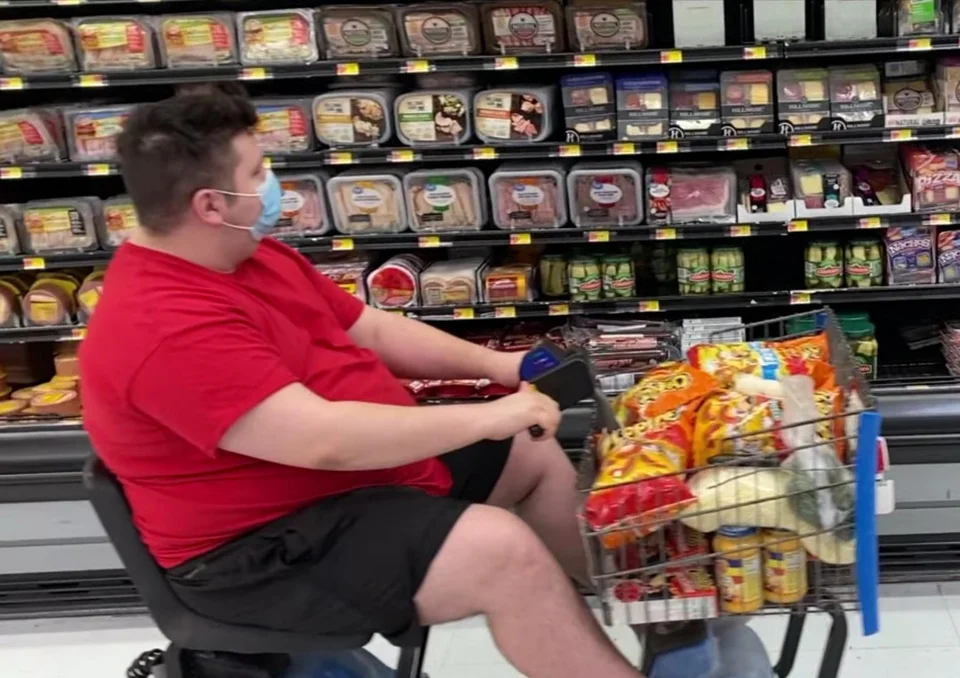Today's post is brought to you by my sponsor, Warp.
Parents, have you noticed your kids like certain foods more than others? I'm certain you have. For the rest of you, trust me, there are studies affirming that people of all ages—not just kids—have food preferences that influence what they choose to eat. On a related note, have you ever heard of food deserts?
What is a food desert? | Food Bank of Wyoming
Food deserts are areas where there's limited access to fresh, nutrient-dense foodstuffs. Residents of these areas have to make due eating fast food, heavily processed microwave meals, soda, and other not-so-healthful items, resulting in food deserts having high rates of chronic illness and obesity if residents aren't willing to travel the, sometimes prohibitively far, distances required to partake in the high-quality grocery shopping that higher-income households are more likely to enjoy. That's the common narrative about food deserts, at least.
There is definitely some truth to the idea. The areas defined as food deserts do feature higher rates of obesity and poverty, and one of the hallmarks of food deserts—fast food joints—predicts eating fast food, whereas supermarket access predicts the opposite.1 There's also evidence that systematic initiatives to promote grocery access in these sorts of underserved areas are lacking.
There is also some natural experimental evidence on the impacts of supermarket openings on purchasing and consumption decisions.
Elbel et al. examined the effects of a new supermarket opening up in the South Bronx due to tax and zoning incentives on "high need" individuals in the area. The effects? After a bunch of tests, there were two marginally significant changes: supermarket shopping increased by 2 pp., where the baseline usage was 94-97%, and there was a 20% decrease in sugary beverage consumption. In a separate study of two neighborhoods in the Bronx, Elbel et al. applied a difference-in-differences design to compare residents of Morrisania and Highbridge before and after the former received a new supermarket. Food intake was not affected. Similarly, Singleton et al. compared communities in Rockford, Illinois who were or were not subject to the Healthy Food Financing Initiative—a program to support healthy food purchasing in "low-resourced communities across the United States." They measured food availability and promotions and found a marginally (p = 0.04) higher availability of frozen vegetables after the initiative was in place.
These sorts of findings are commonplace in the empirical food desert literature: objectively increasing availability and access to food doesn't seem to do much to what people choose to eat or what food is considered available. To understand why, we need to look at some other results.
A Message From My Sponsor
Steve Jobs is quoted as saying, "Design is not just what it looks like and feels like. Design is how it works." Few B2B SaaS companies take this as seriously as Warp, the payroll and compliance platform used by based founders and startups.
Warp has cut out all the features you don't need (looking at you, Gusto's "e-Welcome" card for new employees) and has automated the ones you do: federal, state, and local tax compliance, global contractor payments, and 5-minute onboarding.
In other words, Warp saves you enough time that you'll stop having the intrusive thoughts suggesting you might actually need to make your first Human Resources hire.
Get started now at joinwarp.com/crem and get a $1,000 Amazon gift card when you run payroll for the first time.
Who Counts Calories?
Many cities in the U.S. now have calorie label mandates. The way these usually work is to force local restaurants to provide calorie information for their menu items.
When calorie labeling mandates were implemented in New York and Philadelphia (Newark and Baltimore shown as comparisons), people noticed. People also claimed that calorie labels influenced their purchasing decisions, and they claimed that the direction of influence was generally towards buying fewer calories.
But what, in actuality, happened to their observed calorie consumption? Not a lot! In Baltimore and Philadelphia, calorie consumption fell by similar margins, but Baltimore didn't have a mandate. Similarly, New York City saw an increase in calories purchased over non-mandating Newark.
People said they did one thing in response to the calorie labeling mandate, but they really didn't. That's normal, but it's a surprising finding if you believe people do what they say they do when it comes to eating behaviors. On the other hand, this set of findings is not really surprising if you believe people have food preferences and habits that are hard to change.
Now let's talk about food deserts again.
Structural Modeling Food Deserts
The most extensive and decisive work on the topic of food deserts leveraged thirteen years of grocery store openings and Nielsen Homescan data on people who moved between different geographical areas to fit a structural model explaining why the people in food deserts make different food purchasing decisions than the people elsewhere do.
To get to the structural model results, we have to look at some other results first. Using supermarket entry data, the effect on healthful purchases was estimated to be minimal for openings within 0-10 or 10-15 minutes, with no significant effects for low-income households at all, and only a meager effect in food deserts, but curiously, just for stores 10-15 minutes away rather than 0-10.
When supermarkets entered an area, people did shop at them, but they also didn't seem to shop less at preexisting stores.
The effect of new supermarket openings is to grab a share of local grocery sales, but the effect on healthy eating is glaringly absent, in total, among low-income households, and in food deserts specifically.
The Nielsen Homescan data on people who moved between locations with different levels of typical food consumption healthfulness also suggested that the impacts of local supply on healthful purchasing are minimal. Movers who changed zip codes saw medium-term place effects on the healthfulness of their purchases explaining no more than 2% of the high- versus low-income difference, and movers across counties saw medium-term place effects explaining no more than 3.2% of the difference.
So with these findings in mind, what would it take to make households at all income levels make equally healthy food purchasing decisions? Going from left to right, we get our answer:
Allcott et al. 2019, Figure 6
At baseline, there's a large gap in food purchasing healthfulness, and scaling the lower-income groups' prices to the level observed in the highest-income group does little to change that. Setting the available product nutrient quality to be equal also doesn't do much either, but giving the different income groups identical nutrient preferences does start to make a noticeable difference. Finally, the gap between households with top and bottom incomes is virtually eliminated (reduced by 88-93%) after matching them on their product preferences.
Eat That
The reason food deserts are places where people make so many unhealthy food decisions has little to do with supply and a lot to do with demand. The people living in those places just like eating in ways that are not healthy, for whatever reason. It might be easier to eat processed junk, it might taste better, and much else fits the bill. Those people like eating things that aren't very nutritious on their own, and to get from there to obesity, we also know they like to eat a lot. In fact, eating a lot is really the only way to get to food deserts having an obesity problem, because the people living in them don't eat that much less healthfully, so they must tend to eat excessively.
So here's my advice if you were taken in with the narrative that food deserts are to blame for a big part of the income-health gradient and the obesity crisis. If you want to change the habits of the poor, downtrodden, obese people who disproportionately live in the areas social scientists have dubbed "food deserts", then you should support UBO: Universal Basic Ozempic.
Two notes.
First, this may not predict being fat.
https://www.cdc.gov/pcd/issues/2013/12_0123.htm
Second, it also seems to be the case that food deserts don't attract dollar stores, but when dollar stores enter the area, they might repel supermarkets.
https://www.sciencedirect.com/science/article/abs/pii/S0143622821001132






 DM betting ideas if you want
DM betting ideas if you want










Jump in the discussion.
No email address required.
The USDA food desert map is totally out of touch. It measures distance from the nearest supermarket (If you're more than a mile away in an urban space, or 10 miles in a rural space). I live a few blocks away from a USDA designated "food desert" on the east coast, plugged an address in and wow, it's 2024, Walmart can deliver healthy veggies there for like $10 a month or less if paid annually. The idea that you can't get access to healthy food especially in urban areas is total BS.
Jump in the discussion.
No email address required.
Food desert is when the farmers market stops showing up in your town because no one comes and would just prefer to scarf down fast food from door dash.
Jump in the discussion.
No email address required.
food desert is when wegmans closes due to too much theft and gets replaced by a dollar general which also closes due to theft and eventually gets replaced by a corner store and a head shop
Jump in the discussion.
No email address required.
More options
Context
More options
Context
Can you pay for that with food stamps?
Jump in the discussion.
No email address required.
More options
Context
More options
Context
Who here at rDrama wants to get a one-time paycheck from MarseyXD for a queer 3 dollars?
Jump in the discussion.
No email address required.
They're sending payroll data to the Frenchman so he can write racist articles about it!!!
Jump in the discussion.
No email address required.
More options
Context
So you can wire janny salaries faster and quicker
Waiting patiently
Jump in the discussion.
No email address required.
More options
Context
You have to actually run payroll though? So you need an existing business (unless you want to pay the hundreds to set one up), then pay an "employee" and the payroll taxes and all that shit. Not worth it.
Jump in the discussion.
No email address required.
More options
Context
More options
Context
They will never understand because "access" is a function of demand. These people don't want as many grocery stores as other places because they're fat and too lazy to cook.
Jump in the discussion.
No email address required.
Also anyone in a city in burgerland not having access to anything is bullshit because literally every burger owns at least one car and thus has easy access to anything within 20 miles.
Jump in the discussion.
No email address required.
it's a lot harder to be fat if you don't own a car.
Jump in the discussion.
No email address required.
just spend your whole SSI check on fast food and weed, and let section 8 pay your rent for you
Jump in the discussion.
No email address required.
Coming up with that is Black exellence
Jump in the discussion.
No email address required.
More options
Context
More options
Context
Doordash isnt hard lol
Jump in the discussion.
No email address required.
More options
Context
More options
Context
More options
Context
More options
Context
Food deserts arent real. Yall just aint creative according to chudsister Bukele.
!latinx
!neolibs
!commies
Jump in the discussion.
No email address required.
You can't laugh at haitians eating dirt, it's about captialism
Jump in the discussion.
No email address required.
More options
Context
Wypipo don't season they dirt
Jump in the discussion.
No email address required.
More options
Context
Haitians eat dirt cookies but I'm supposed to believe they won't eat their neighbors cat?
Jump in the discussion.
No email address required.
Why would they eat cats, theres very little dirt in them.
Jump in the discussion.
No email address required.
More options
Context
More options
Context
More options
Context
Did you just advertise to me in your fricking longpost
Jump in the discussion.
No email address required.
Heck yeah I did. Join Warp today!
Jump in the discussion.
No email address required.
More options
Context
More options
Context
The horsemen famine doesn't need there to be an absence of food. Just food that provide no nutritional value. That keeps you fat and rots your brain as your body slowly breaks down.
Jump in the discussion.
No email address required.
I hated in the good omens tv show when they presented the zero calorie food as some eeeevil apocalyptic capitalist nightmare when in reality a zero calorie burger that tastes and feels just like the real thing would be an objective good for the health and well being of america
Jump in the discussion.
No email address required.
Yeah the show was very eh compared to the book.
Jump in the discussion.
No email address required.
the zero calorie food as some sort of evil plot was from the book too. it may have made some amount of sense in 1990 when anorexia and skeletally thin models were a controversial topic, but it aged like milk
Jump in the discussion.
No email address required.
I mean I think it less about anorexia and more like you're just consuming slop of carbs and no vitamins and nutrients. You're eating 'stuff' but nothing with nutritional value to help your body.
That's how I see the American diet
Jump in the discussion.
No email address required.
If that was what they meant then they explained it terribly, because the reason American food is so bad is because it's ALL calories and no nutrition, but the evil food was no calories, which is no more evil than celery and lettuce, stuff that poncy coastal loser nerd Gaiman probably adores
Jump in the discussion.
No email address required.
I'm wondering if Terry Pratchett wrote one thing and then Neil wrote it as something else
Jump in the discussion.
No email address required.
I feel like you can always tell the heavily Neil parts because there's parts that are super jarring and tonally inconsistent. Like the part where all the call center workers are brutally and horrifically killed which comes off 100% as rich smug boy Gaiman having a rage jerkoff over some filthy poors having a job he disapproves of
Jump in the discussion.
No email address required.
More options
Context
More options
Context
More options
Context
More options
Context
More options
Context
More options
Context
More options
Context
More options
Context
the only place I've ever seen a real food desert is in NYC. There are no real grocery stores, just "bodegas", which are actually convenience stores that people who talk about food deserts think are quirky and authentic places to eat and they love them
Jump in the discussion.
No email address required.
i lived in flushing for 2 years and there were plenty of grocery
were plenty of grocery  stores
stores
Jump in the discussion.
No email address required.
You mean pet stores?
Jump in the discussion.
No email address required.
More options
Context
More options
Context
More options
Context
I've seen enough deathfats to know that they only go to the supermarket if they're desperate. And if they do, they get the bulk carb cakes from the dessert section, instant pizza, and bottles of soda.
They can be surprisingly frugal with food if they're actually broke, shitty carbs cost next to nothing, same with soda.
Jump in the discussion.
No email address required.
More options
Context
!effortposters
Jump in the discussion.
No email address required.
Ctrl-C, Ctrl-V
Jump in the discussion.
No email address required.
That's effort
Jump in the discussion.
No email address required.
More options
Context
More options
Context
More options
Context
The leftoids and chuds are both wrong on this one. OP's link makes the former case, so I'll make the latter (still accounting for the former).
Food deserts are definitely demand-driven, but some of the factors affecting demand go beyond r-slurred cultural factors. Normalizing for purchasing power still doesn't normalize for storage, appliances, transportation, and time.
Storage is a factor balanced against transportation. One of them can be frustrating, and it will still work out. Both, however, makes grocery shopping challenging. In college, I had no car and lived about a mile from the closest grocery store. I shared a fridge with three other roommates. I could basically but -tier frozen dinners and some veggies at most. The situation is similar if someone lacks a full-size fridge.
-tier frozen dinners and some veggies at most. The situation is similar if someone lacks a full-size fridge.
Appliances matter, too. I stayed with a friend in Berlin last year, and I forgot what it was like to take a functional range for granted. He also didn't have a dishwasher. Preparing food was a much bigger pain than for me at home now.
Finally, there's time. Shopping and cooking trades time for money, but the pressures on time can be severe for someone juggling jobs and exhaustion. Poor people often work surprisingly long hours with long commutes. It's such an issue that I've sometimes said, "Time is most precious for the very rich and the very poor."
And then there are the people who just make shitty decisions. Those folks are abundant, too.
Jump in the discussion.
No email address required.
I don't believe this for a second
Jump in the discussion.
No email address required.
They need to do that secret eaters show, but with poors who go on about how long they work and all the nice things they do and how they don't have time to go to the DMV - your average hood BIPOC and your average /r/antiwork redditor and average Springfield, OH resident. Caleb Hammer can host.
Jump in the discussion.
No email address required.
More options
Context
More options
Context
neighbors dont have fridges and ovens
Jump in the discussion.
No email address required.
More options
Context
Most of your points have nothing to do with food deserts. Building a supermarket nearby won't fix issues regarding food storage or preparation. Also, poor people on average work fewer hours.
Jump in the discussion.
No email address required.
More options
Context
Fatty apologia
Jump in the discussion.
No email address required.
More options
Context
Jump in the discussion.
No email address required.
More options
Context
More options
Context
I'm a big fan of Cremieux-posting.
Jump in the discussion.
No email address required.
More options
Context
Sir, know your audience. The number of people here who understand how parallel trends work is small enough the rest of them can count it if they mouth out the numbers & use their hands.
Its food education and that lifetime dietary habits tend to be established in childhood. Was that so fricking hard to just say?
There have been attempts at school level interventions to teach healthful cooking & eating, abundantly demonstrated to also translate in to improved household nutrition, but the more effective ones have been strongly resisted. The chuds don't want their boys to learn how to cook and the companies who supply school meals don't want their gravy train to end.
This doesn't disprove food deserts. Its also entirely ignoring the literature on convenience factors which is largely the problem in $CurrentYear with instacart existing. We should take fatties kids away from them if they wont feed them healthy food.
Which everyone knew would be as pointless as calorie labels on other food. The people who care about calorie counts are already eating highly satiating whole foods.
Europe switched to color coding their labels because people are so abysmal at understanding numbers. These are the same people who made McDonalds switch the 1/3rd pounder back to the 1/4 pounder because they thought 1/3 was smaller than 1/4.
Its also the design of grocery stores. Grocery stores have an absolutely pathetic margin so they try to use psychological factors to drive purchase of their higher yield products. Placement in store and placement on shelf are huge factors, brands pay kickbacks for stores that place their products in the 2-4ft from floor range as thats where consumers eyes are most likely to fall. This is why in convenience stores etc you see representatives of the brands stocking products, they are renting shelf space from the store. Walmart is the worst for this by a significant margin.
Frick that. If they take a shortcut rather than fixing their shitty lifestyle their lifetime healthcare expenses are higher, I don't want to pay for that shit.
Particularly the mayos. At least the blacks have the decency to tend to die young with minimal end of life medical expenses. Old fat white women are a drain on society and should be executed.
Jump in the discussion.
No email address required.
More options
Context
tl;dr - fat fricks stuff their cavernous maws with shit and get fatter.
Jump in the discussion.
No email address required.
More options
Context
Interestingly this is the same Warp that was involved in the recent twitter racism controversy where a brand affiliate tweeted.
"I like white people more, they do more, they are better at their roles, I need to climb the Kardashev scale, I will let black people run and play basketball"
Jump in the discussion.
No email address required.
More options
Context
Summary: More like food desserts amirite?
Jump in the discussion.
No email address required.
More options
Context
Snapshots:
https://www.cremieux.xyz/p/food-deserts-are-not-real:
ghostarchive.org
archive.org
archive.ph (click to archive)
Warp:
ghostarchive.org
archive.org
archive.ph (click to archive)
joinwarp.com/crem:
ghostarchive.org
archive.org
archive.ph (click to archive)
Jump in the discussion.
No email address required.
More options
Context
"me getting open access to hormones makes me happier, it says it right here in the voluntary web survey"
Jump in the discussion.
No email address required.
More options
Context